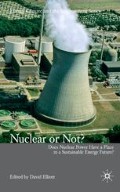Abstract
This chapter reflects upon the history of the environmental movement as well as the UK energy policy context and global resource base, to pose a number of questions. Can nuclear power be considered a ‘green’ technology if it is part of a wider response to the threat of climate change? Should the green movement engage in a reappraisal of its core values in order to address this issue? Is an anti-nuclear stance fundamental to green ideology, or can it be discarded as ‘excess baggage’? Is it possible for environmentalist opinion to converge with that of the nuclear industry, and can they be reconciled as ‘separate but different’, possibly even complementary?
Preview
Unable to display preview. Download preview PDF.
References
Alexander, G. and G. Boyle (2004) Introducing renewable energy. In: Renewable Energy: power for a sustainable future, 2nd edn. (G. Boyle, ed.). Oxford University Press, Oxford.
BWEA, REA and others (2005) The Renewable Energy Manifesto: an action plan to deliver 25% of the UK’s energy from renewables by 2025. Press release by eleven UK renewable energy trade associations, 21 February 2005. British Wind Energy Association/Renewable Energy Association, London.
Cohen, B.L. (1983) Breeder reactors: a renewable energy source. Am. J. Phys.51, 75–76.
DTI (2003) Our Energy Future — Towards a Low Carbon Economy, Energy White Paper, Cm 5761. Department of Trade and Industry, London/ HMSO, Norwich.
DTI (1995) The Prospects for Nuclear Power: Conclusions of the Government’s Nuclear Review, Cm 2860. Department of Trade and Industry, London/HMSO, Norwich.
FoE (2004) Why nuclear power is not an achievable and safe answer to climate change. Briefing pamphlet, Friends of the Earth, London, www.foe.org.uk.
Goldemberg, J., T. Johansson, A.K.N. Reddy and R. Williams (1988) Energy for a Sustainable World. Wiley Eastern, New York/Delhi.
Harper, P. and P. Allen (2004) New Ethical Perspectives in Energy Policy. Commentary on the Conference on Gaia and Global Change, Dartington Hall, Devon, UK, June 2004, extract quoted in Renew 152 Nov-Dec 2004, p. 33.
Kahn, H., W. Brown and L. Martel (1976) The Next Two Hundred Years: a scenario for America and the world. William Morrow and Co., New York. 241 pp.
Meadows, D.H., D.L. Meadows, J. Randers, and W.W. Behrens III (1972) The Limits to Growth. Universe Books, New York.
RAE (2004) The Costs of Generating Electricity. Royal Academy of Engineering, London. 56 pp.
SDC (2006) The Role of Nuclear Power in a Low Carbon Economy. Sustainable Development Commission, London. 24 pp.
Zubrin, R. (1996) The Case for Mars.Simon and Schuster, London, 328 pp.
Editor information
Editors and Affiliations
Copyright information
© 2007 Jonathan Scurlock
About this chapter
Cite this chapter
Scurlock, J. (2007). Can Nuclear Power Ever be Green?. In: Elliott, D. (eds) Nuclear or Not?. Energy, Climate and the Environment Series. Palgrave Macmillan, London. https://doi.org/10.1057/9780230279346_16
Download citation
DOI: https://doi.org/10.1057/9780230279346_16
Publisher Name: Palgrave Macmillan, London
Print ISBN: 978-0-230-24173-2
Online ISBN: 978-0-230-27934-6
eBook Packages: Palgrave Political & Intern. Studies CollectionPolitical Science and International Studies (R0)

